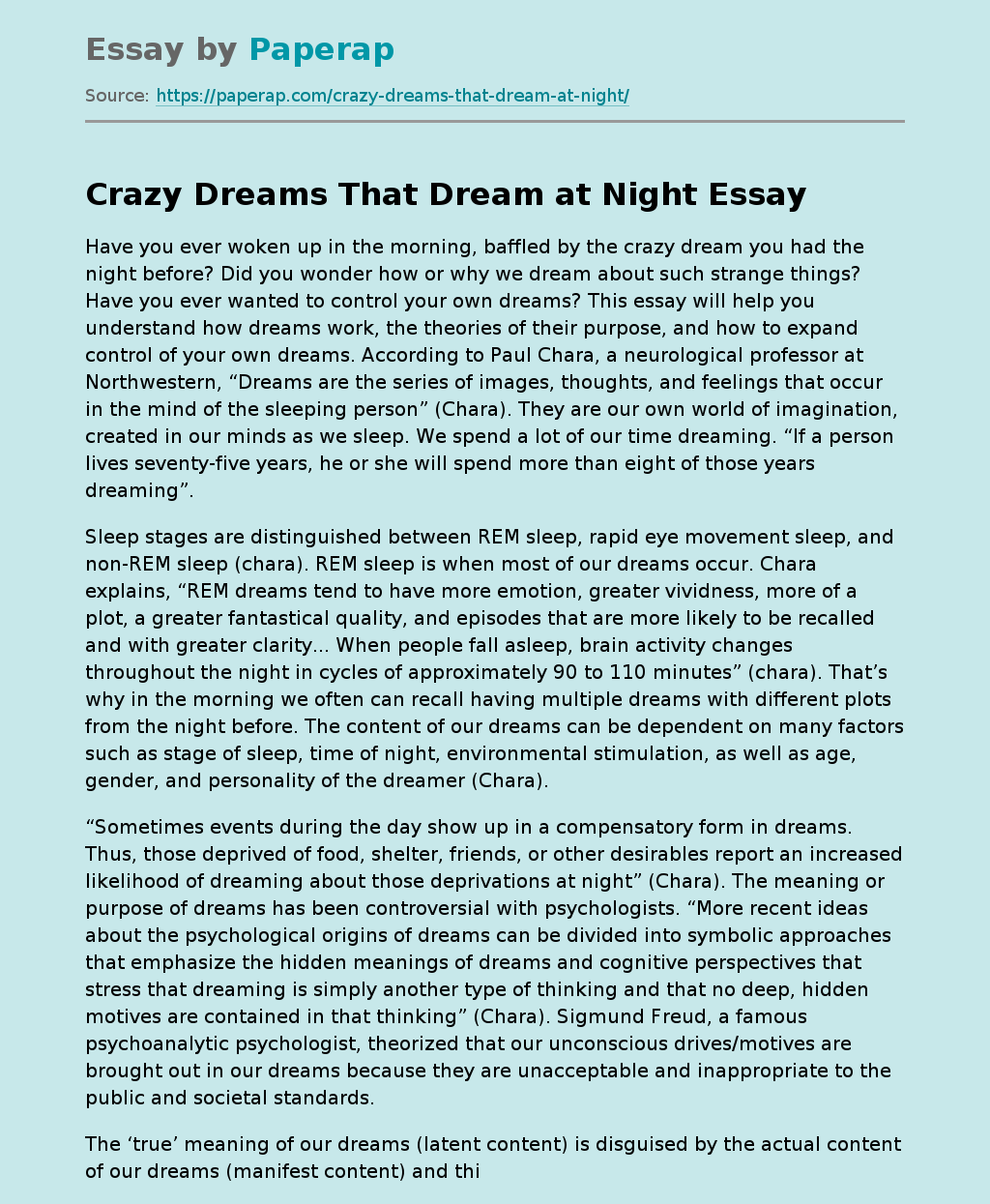Crazy Dreams That Dream at Night
Have you ever woken up in the morning, baffled by the crazy dream you had the night before? Did you wonder how or why we dream about such strange things? Have you ever wanted to control your own dreams? This essay will help you understand how dreams work, the theories of their purpose, and how to expand control of your own dreams. According to Paul Chara, a neurological professor at Northwestern, “Dreams are the series of images, thoughts, and feelings that occur in the mind of the sleeping person” (Chara).
They are our own world of imagination, created in our minds as we sleep. We spend a lot of our time dreaming. “If a person lives seventy-five years, he or she will spend more than eight of those years dreaming”.
Sleep stages are distinguished between REM sleep, rapid eye movement sleep, and non-REM sleep (chara). REM sleep is when most of our dreams occur. Chara explains, “REM dreams tend to have more emotion, greater vividness, more of a plot, a greater fantastical quality, and episodes that are more likely to be recalled and with greater clarity… When people fall asleep, brain activity changes throughout the night in cycles of approximately 90 to 110 minutes” (chara).
That’s why in the morning we often can recall having multiple dreams with different plots from the night before. The content of our dreams can be dependent on many factors such as stage of sleep, time of night, environmental stimulation, as well as age, gender, and personality of the dreamer (Chara).
“Sometimes events during the day show up in a compensatory form in dreams. Thus, those deprived of food, shelter, friends, or other desirables report an increased likelihood of dreaming about those deprivations at night” (Chara). The meaning or purpose of dreams has been controversial with psychologists. “More recent ideas about the psychological origins of dreams can be divided into symbolic approaches that emphasize the hidden meanings of dreams and cognitive perspectives that stress that dreaming is simply another type of thinking and that no deep, hidden motives are contained in that thinking” (Chara). Sigmund Freud, a famous psychoanalytic psychologist, theorized that our unconscious drives/motives are brought out in our dreams because they are unacceptable and inappropriate to the public and societal standards.
The ‘true’ meaning of our dreams (latent content) is disguised by the actual content of our dreams (manifest content) and this symbolism must be interpreted from there (Chara). Another approach, brought about by Carl Jung, an additional psychoanalytic psychologist during Freud’s time, proposed the idea that “dreams balance the mind by compensating for what is lacking in the way a person is living life” (Chara). Some common phenomena related to dreaming are nightmares and night terrors. According to John Beebe, a Jungian analyst who received his degrees from Harvard College and the University of Chicago medical school, there is a difference between nightmares, night terrors, and bad dreams (Beebe). “Common nightmares occur in REM sleep and are caused by many factors, such as unpleasant circumstances in life, daily stresses, or traumatic experiences” (Chara).
There are three types of nightmares: symbolism of the next stages of life, exposing shocking shadows of other people, and “empathy dream” (Bebee). Bad dreams fall into the nightmare category but are characterized as less vivid than nightmares. “Night terrors are most likely to occur in stage-four sleep and are characterized by sudden awakening, terror-stricken reactions, and disorientation that can last several minutes. Night terrors are rarely recollected” (Chara). Not everyone has night terrors, but most have nightmares. Both are normal occurrences, but in extreme circumstances, might require medical or clinical attention.
If you have ever wanted to be able to control what you do in your dreams you are in luck. What you and many others have wanted to do, is called lucid dreaming. Stephen LaBerge is an oneirologist who received his Ph. D. at Stanford for psychophysiology and devoted his life to studying lucid dreaming. “Lucid dreaming is a remarkable state of consciousness in which one is aware of the fact that one is dreaming while continuing to dream” (LaBerge et al). LaBerge conducted a double-blind, placebo controlled, crossover study that investigated techniques to induce lucid dreaming. In the study, participants that took galantamine, in addition to other procedures, saw a significant increase in lucidity compared to participants taking an active placebo.
The MILD, or Mnemonic Induction of Lucid Dreams, technique trained participants on strategies for recognizing when they are dreaming as well as how to prolong and navigate a lucid dream. The technique involves dream recall, checking if you are dreaming, lucid affirmations or citations, and visualizing your dreams. The sleep interruption technique is “a modified sleep schedule in which participants interrupted their sleep with a 30-minute period of wakefulness after approximately 4.5 hours of sleep”. Understanding how to identify when you are dreaming is a very important part of lucid dreaming. LaBerge explains, “…lucid dreams are best characterized by increased control, cognitive clarity, positive emotion, and sensory vividness” . “During lucid compared to non-lucid dreams, participants reported significantly higher sensory vividness, clarity, positive emotion, control, and self-reflection.
Increased complexity and bizarreness and decreased negative emotion were also observed…”. Lucid dreaming also has a purpose as a treatment for certain sleep-related issues. Dr. Brigitte Holzinger, the director of both, the Institute for Consciousness and Dream Research, as well as the Austrian Sleep Research Association, says that a possible application of lucid dreaming is in the field of psychotherapy, as a tool to reduce nightmares. Whether you are fascinated by dreams as they are, or interested in lucidity, the world of dreams as a whole is a vast pool of imagination and marvel. After reading this essay, you should have a greater understanding of our nighttime adventures, including the purposes, as well as the possible experiences to come, of your own dreams.
Crazy Dreams That Dream at Night. (2021, Dec 14). Retrieved from https://paperap.com/crazy-dreams-that-dream-at-night/

